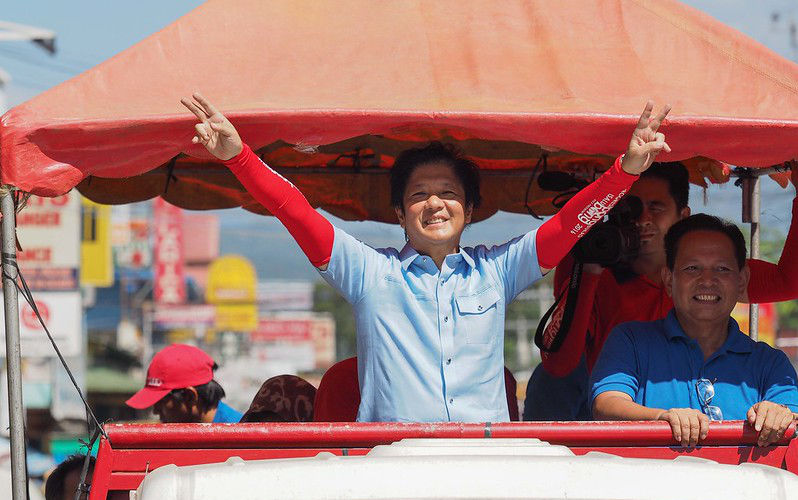What Philippines’ Marcos Jnr can learn from Singapore and Indonesia about balancing ties with China, US
September 17, 2022
“With respect to our place in the community of nations, the Philippines shall continue to be a friend to all. And an enemy to none,” declared President Ferdinand Marcos Jnr, in his first state-of-the-nation address. “We will be a good neighbour – always looking for ways to collaborate and cooperate with the end goal of mutually beneficial outcomes,” he added, setting the tone for his foreign policy for the next six years.
But the highlight of the speech, which drew a standing ovation in the Philippine legislature, was when Marcos Jnr made clear that his administration “will not waver, we will stand firm in our independent foreign policy, with the national interest as our primordial guide”. For the first time, the Philippines has an opportunity to adopt a truly “independent” foreign policy, notwithstanding its US treaty alliance.
Against this backdrop, Marcos Jnr, better known as “Bongbong”, chose Indonesia and Singapore for his first foreign visits. Beyond cultivating ties with fellow Association of Southeast Asian Nations members, he can also draw precious lessons from the two countries, which have maintained stable and fruitful ties with rival superpowers.
Since president Fidel Ramos, Filipino leaders have traditionally chosen ASEAN nations for their first foreign visits. This is partly because Filipino presidents are often inaugurated just months before the major ASEAN confabs, including the East Asia Summit, which brought global leaders to Southeast Asia. But it’s also a reflection of the Philippines’ role as a founding ASEAN member.
Marcos Jnr is also drawing lessons from his late father who, during his decades-long tenure, pursued strategic ties not only with major power blocs at the height of the Cold War, but also with fellow postcolonial nations in Asia, Africa and Latin America. The late Filipino strongman projected himself as among ASEAN’s pre-eminent leaders.
Marcos Jnr chose to visit Indonesia and Singapore first to deepen the vital and highly promising bilateral relations. In Indonesia, he signed US$8.5 billion in business deals to boost agricultural and infrastructural development, the key thrusts of his domestic agenda.
Following his meeting with Indonesian President Joko Widodo, both countries also doubled down on efforts to “enhance collaboration” in defence and strategic affairs. In recent years, both sides have been conducting joint border patrols.
In Singapore, a major economic partner of the Philippines, Marcos Jnr also pushed for greater investments in strategic sectors, including in the Clark special economic zone in the Philippines, as well as deepened defence cooperation, especially in the realm of counterterrorism.
Marcos’ regional visits come ahead of a trip to New York this month for the UN General Assembly, where he is likely to meet world leaders such as US President Joe Biden. Soon, he will have to choose which major power to visit first: China (which former president Rodrigo Duterte visited first) or the United States, which most of his predecessors chose to prioritise.
Thankfully, Marcos Jnr can draw on strategic lessons gleaned from his recent visits to adopt an optimal approach to the major powers. After all, the Philippines has many similarities with Indonesia, a fellow democracy and similarly massive archipelago, while Singapore has been hailed as a governance model by many Filipino leaders, including Marcos Jnr himself and his late father.
To begin with, the two nations are masters of dynamic balancing among the major powers. Both Singapore and Indonesia enjoy robust defence and economic cooperation with the US, China and other major powers. At the same time, they have deftly resisted excesses by any superpower, especially when it affected the interests of smaller nations.
For instance, they have upheld modern international law as a basis for the resolution of maritime disputes between China and its neighbours, criticised American unilateralism under former president Donald Trump, and even censured Russia’s invasion of Ukraine.
Second, they are proactive contributors to regional peace and stability. They have been instrumental to the institutionalisation of ASEAN and the preservation of “ ASEAN centrality” by advocating for a more inclusive order in the Indo-Pacific.
At times, especially during former Singaporean leader Lee Kuan Yew’s tenure, they even served as primary interlocutors between the West and China. More recently, Indonesia, currently the G20 rotating president, has sought to mediate between the US, on one hand, and China and Russia on the other, amid the conflict in Ukraine.
The upshot of the Indonesia-Singapore leadership tandem in Southeast Asia is the emergence of ASEAN as the primary platform for institutionalised dialogue among major powers in the Indo-Pacific.
Aside from their deliberate strategy of “omni-enmeshment”, namely establishing cross-cutting networks of cooperation with rival powers under the aegis of ASEAN, the two countries have also developed their defensive capabilities.
To avoid dependence on or vulnerability to any superpower, both have instead relied on their armed forces to protect their national interests. While Singapore boasts one of the most capable militaries in the world, Indonesia has embarked on a US$125 billion military modernisation programme to deter aggression.
Since the end of the second world war, the Philippines has effectively outsourced its external security obligations to the US, its sole treaty ally.
By adopting appropriate lessons from strategically adept neighbours, Marcos Jnr can oversee a new era of more independent and proactive foreign policy, which could help the Philippines reclaim pride of place within ASEAN and the broader region.
Republished from The South China Morning Post.
